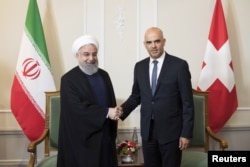Foreign ministers from Iran and the four world powers that still want to be a part of the nuclear agreement they signed in 2015 are set to hold talks Friday on how to maintain the deal following the withdrawal of the United States.
Iranian state media reported Tuesday that Foreign Minister Mohammad Javad Zarif would meet in Vienna with his counterparts from Britain, China, France, Russia and Germany.
Iranian President Hassan Rouhani is also traveling to Switzerland and Austria this week on his own diplomatic tour to try to preserve the agreement that limits Iran's nuclear activity in exchange for sanctions relief. He said he expects European countries to unveil a package of measures in the coming days designed to keep the deal alive.
U.S. President Donald Trump pulled the United States of out the agreement in May. All the other parties to the nuclear deal say they remain committed to the agreement and have expressed strong disappointment at Washington's withdrawal.
The United States on Monday announced its plans to reimpose tough sanctions on Iran's energy and banking sectors, saying the Iranian government needs to change its behavior and act like a "normal country."
"Our goal is to increase pressure on the Iranian regime by reducing to zero its revenue on crude oil sales," said Director of Policy Planning Brian Hook. "We are working to minimize disruptions to the global market but we are confident there is sufficient global spare oil capacity."
During a press briefing at the State Department, Hook called on the Iran to meet demands in order to deem it what he called a "normal country."
"Normal countries don't terrorize other nations, proliferate missiles, and impoverish their own people," Hook said. "As Secretary [of State Mike] Pompeo has said, this new strategy is not about changing the regime, it is about changing the behavior of the leadership in Iran to comport with what the Iranian people really want them to do."
The State Department's director of policy planning noted the first part of U.S. sanctions will snap back in early August (August 6). These sanctions will include targeting Iran's automotive sector, trade and gold, and other key metals. He said the remaining U.S. sanctions will snap back in early November (November 4). These sanctions will include targeting Iran's energy sector and petroleum related transactions and transactions with the central bank of Iran.
In addition to the sanctions on Iran, the United States has warned other countries that they will also face sanctions if they continue to trade with sanctioned sectors of the Iranian economy.
Hook said State Department and Treasury officials are traveling around the world meeting with U.S. allies to try to convince them to cooperate with the sanctions.











